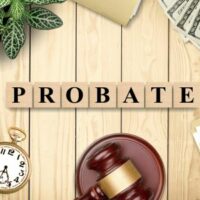Do All Assets Pass Through Probate In Connecticut?

Shirley’s mom Ellen recently passed away without a will or estate planning documents of any kind. Shirley has seven siblings, but as the eldest, she has taken the responsibility of navigating the estate administration process. Unfortunately, she doesn’t know where to begin, bill collectors are calling non-stop, late payment collection letters are coming, and she is still waiting on a copy of her mother’s death certificate to cancel the utility and phone bills. Now her brothers are arguing about who will get the house and Ellen’s vintage car. Shirley needs help. She knows she needs to open an estate but is bewildered about what probate administration entails. Fortunately, a trust and estates attorney can assist clients like Shirley through every step of the process.
What is Probate, Exactly?
Probate is a court-administered process by which a deceased person’s estate is wound up and closed. This initially involves providing the court with the Will and Testament executed by the decedent. The executor of the will must then furnish the probate court with a list of the decedent’s assets that are subject to probate administration as well as the decedent’s liabilities. The assets include the decedent’s place of residence, additional real estate properties, rental properties, vehicles, furnishings, jewelry, vehicles, recreational items, bank accounts, interest-bearing accounts, securities, some intellectual property, and the like. All debts also must be settled during probate. Closing an estate can be time-consuming, especially if there is a dispute as to how property can be distributed, if multiple creditors have claim to an estate or if an interested person disputes the contents of a decedent’s will.
When a person dies intestate (i.e. without a will), their property must also be probated. This can be difficult for the family as someone must serve as personal representative. The personal representative must apply the property distribution statutes, even when the family disagrees and has other ideas as to how assets will be distributed equitably. This is often the source of frustration and cause division in family relations that the decedent wanted to avoid.
The probate of an estate that has a last will is preferable as the person’s property will be distributed in accordance with the decedent’s wishes. Probating an intestate estate is very likely to lead to family discord, frustrations and division among the family members.
What are Some Common Exemptions to Probate Administration?
If a decedent dies leaving a surviving spouse who is named as joint owner in survivorship to real property (like a marital or a joint home), the house may be exempt from probate administration. Similarly, if the decedent’s bank accounts are jointly owned the spouse, they too might be exempt from probate administration. Likewise, assets placed in a trust may transfer outside of probate administration.
However, even if all of the decedent’s property passes outside of probate, an estate must still go through a probate court, even if is it in a minimal fashion. Every probate estate must be reviewed to determine whether Connecticut and Federal estate tax is due. More on estate taxes will be discussed in a future installment of this blog.
Contact Attorney Brian S. Karpe to Schedule a Consultation
Mourning the loss of a loved one is a solemn process. It can be difficult to process grief when loved ones are left worrying about navigating the probate estate and probate administration. Whether your loved one recently passed away with or without a will and you are unsure how to proceed, contact Canton probate attorney Brian S. Karpe. Call today to schedule a consultation.
Resource:
ctprobate.gov/Pages/TrustsEstates.aspx
